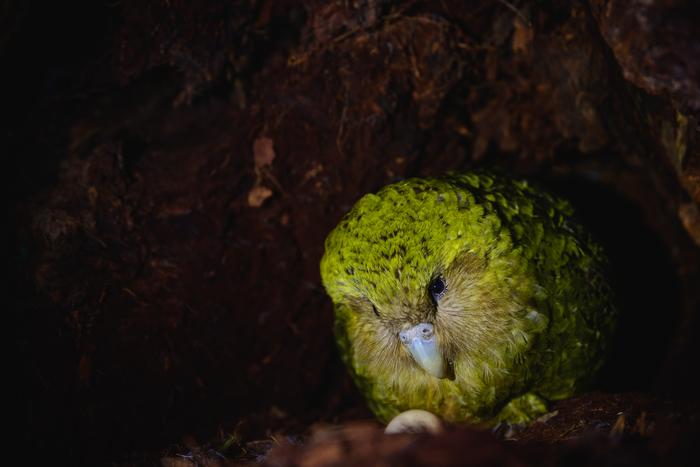
Credit: Jake Osborne
High-quality sequencing of nearly the entire kākāpō population, funded through a Genomics Aotearoa project, is helping New Zealand to manage the health of this critically endangered species.
Not only is it already making a difference to kākāpō survival, but establishing sequencing methods to work with populations under threat is also likely to be the foundation for the future of endangered wildlife science in New Zealand and the rest of the world.
The state-of-the-art methods developed by Dr. Joseph Guhlin (University of Otago ) and an international team to study kākāpō has revealed important aspects of kākāpō biology. The methods, reusable code, and pipeline is a blueprint and tool for conservation genomics in other species, especially intensively managed species. This has massive implications.
Dr. Guhlin’s work over the last year have two very significant outcomes:
- an in-depth understanding of kākāpō biology that simply would not be possible without genomics
- high-quality code and reusable pipeline – allowing other researchers to rapidly integrate these methods into their own work – which has significantly advanced New Zealand’s genomic capability.
This has given researchers the tools needed to identify specific genetic characteristics that are crucial to survival.
“Using technology created by Google, we have achieved what is likely the highest quality variant dataset for any endangered species in the world. This dataset is made available, through DOC and Ngai Tahu, for future researchers working with Kākāpō,” Dr Guhlin said.
Department of Conservation’s Science Advisor for Kākāpō Recovery, Dr. Andrew Digby, believes the genetic tools this study provides will make an immense difference to kākāpō conservation.
“Kākāpō suffer from disease and low reproductive output, so by understanding the genetic reasons for these problems, we can now help mitigate them. It gives us the ability to predict things like kākāpō chick growth and susceptibility to disease, which changes our on-the-ground management practices and will help improve survival rates.”
While the study marks the beginning of a new era of kākāpō conservation genetics, Dr Digby acknowledges what it means for the future of all threatened species.
“The Kakapo125+ project is a great example of how genetic data can assist population growth. The novel genetic and machine learning tools developed can be applied to improve the productivity and survival of other taonga under conservation management.”
The research results have been published in the prestigious international journal Nature Ecology and Evolution.
For more information, please contact Dr. Joseph Guhlin, Phone 027-867-2100, [email protected] and [email protected]
About Genomics Aotearoa
Genomics Aotearoa is a collaborative platform of 10 research institutes and universities, established to ensure that New Zealand is internationally participating and leading in the rapidly developing fields of genomics (the study of the genome, the complete set of genetic material present in a cell or organism) and bioinformatics (the development of methods and software tools for understanding the biological data derived from genomics).
An important aspect of Genomics Aotearoa’s research approach is that developing and fine-tuning genomic processes in one species will potentially produce valuable roadmaps for analysing genetic diversity in others across humans, environment, and primary production. This is already starting to happen.
Journal
Nature Ecology & Evolution
DOI
10.1038/s41559-023-02165-y
Article Title
Species-wide genomics of kākāpō provides tools to accelerate recovery
Article Publication Date
28-Aug-2023




